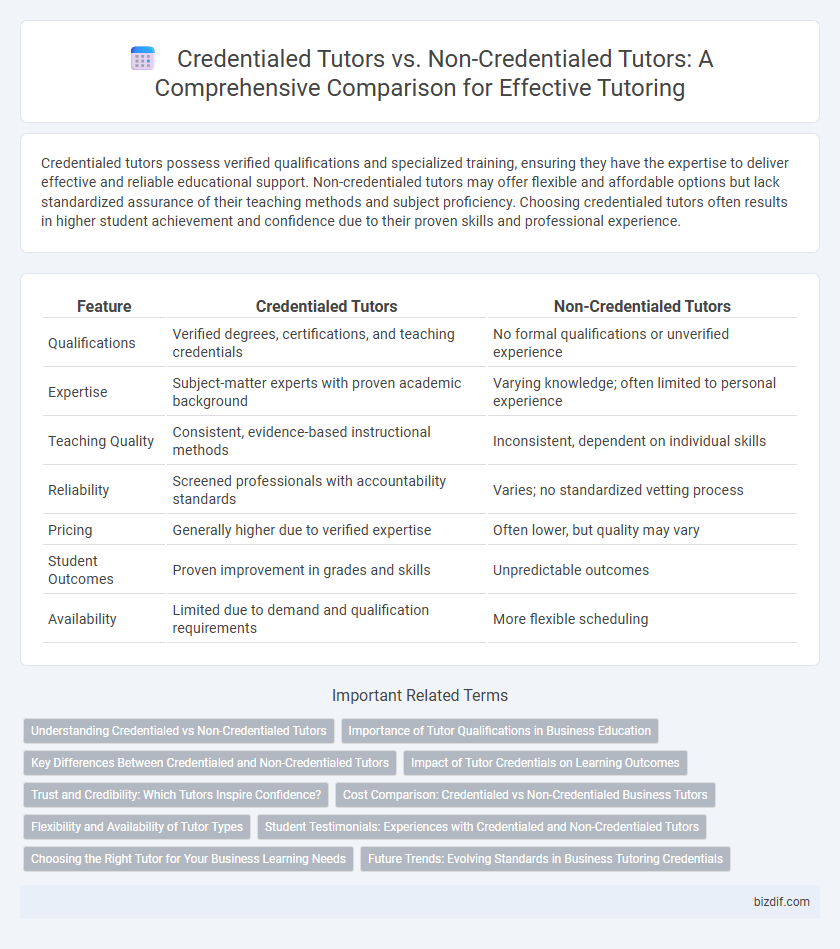Credentialed tutors possess verified qualifications and specialized training, ensuring they have the expertise to deliver effective and reliable educational support. Non-credentialed tutors may offer flexible and affordable options but lack standardized assurance of their teaching methods and subject proficiency. Choosing credentialed tutors often results in higher student achievement and confidence due to their proven skills and professional experience.
Table of Comparison
| Feature | Credentialed Tutors | Non-Credentialed Tutors |
|---|---|---|
| Qualifications | Verified degrees, certifications, and teaching credentials | No formal qualifications or unverified experience |
| Expertise | Subject-matter experts with proven academic background | Varying knowledge; often limited to personal experience |
| Teaching Quality | Consistent, evidence-based instructional methods | Inconsistent, dependent on individual skills |
| Reliability | Screened professionals with accountability standards | Varies; no standardized vetting process |
| Pricing | Generally higher due to verified expertise | Often lower, but quality may vary |
| Student Outcomes | Proven improvement in grades and skills | Unpredictable outcomes |
| Availability | Limited due to demand and qualification requirements | More flexible scheduling |
Understanding Credentialed vs Non-Credentialed Tutors
Credentialed tutors possess formal qualifications and certifications that validate their expertise and teaching skills, ensuring a structured and reliable learning experience. Non-credentialed tutors may rely on personal knowledge or experience without official recognition, which can result in varied teaching quality and less consistent outcomes. Choosing credentialed tutors often leads to better student progress due to their verified instructional methods and subject mastery.
Importance of Tutor Qualifications in Business Education
Tutor qualifications play a critical role in business education by ensuring subject matter expertise and effective teaching methodologies. Credentialed tutors possess formal education and relevant certifications that validate their knowledge of business concepts, enhancing student comprehension and performance. Non-credentialed tutors may lack this verified expertise, potentially limiting the quality and reliability of the educational experience.
Key Differences Between Credentialed and Non-Credentialed Tutors
Credentialed tutors possess formal qualifications such as teaching certifications or subject-specific degrees, ensuring adherence to standardized educational methodologies and accountability. Non-credentialed tutors often rely on personal expertise or experience without formal validation, which may result in variable instructional quality and less structured learning plans. The key differences lie in verified qualifications, consistency in teaching standards, and the ability to develop curriculum-aligned tutoring strategies.
Impact of Tutor Credentials on Learning Outcomes
Credentialed tutors, often holding specialized certifications and advanced degrees, consistently demonstrate higher effectiveness in improving student learning outcomes through evidence-based instructional strategies. Non-credentialed tutors may lack formal training, potentially leading to inconsistent teaching quality and less measurable academic progress. Research indicates that the presence of certified qualifications correlates with increased student engagement, comprehension, and standardized test performance.
Trust and Credibility: Which Tutors Inspire Confidence?
Credentialed tutors, often certified and formally trained, instill greater trust and credibility due to verified expertise and adherence to educational standards. Non-credentialed tutors may lack formal qualifications, making it challenging for parents and students to confidently assess their teaching effectiveness. Trust in tutoring is significantly influenced by credentials, professional backgrounds, and documented success, which credentialed tutors are more likely to demonstrate.
Cost Comparison: Credentialed vs Non-Credentialed Business Tutors
Credentialed business tutors typically charge higher rates due to verified expertise, formal education, and proven teaching methodologies, often ranging from $50 to $150 per hour. Non-credentialed tutors offer more affordable options, with fees commonly between $20 and $60 per hour, though their instructional quality and subject knowledge can vary significantly. Investing in credentialed tutors can yield higher returns through targeted, effective tutoring despite the increased upfront cost.
Flexibility and Availability of Tutor Types
Credentialed tutors typically offer structured schedules aligned with academic standards but may have limited flexibility due to formal commitments and institutional requirements. Non-credentialed tutors often provide greater availability and adaptable session times, catering to diverse learning needs and spontaneous scheduling. The choice between these tutor types impacts accessibility, with non-credentialed tutors excelling in flexible arrangements while credentialed tutors prioritize standardized educational quality.
Student Testimonials: Experiences with Credentialed and Non-Credentialed Tutors
Student testimonials reveal that credentialed tutors consistently deliver structured, effective learning experiences, often citing improved grades and greater confidence. Non-credentialed tutors receive mixed reviews, with some students appreciating personalized approaches but others noting gaps in subject expertise. Credentialing status frequently emerges as a key factor in students' trust and satisfaction levels with tutoring services.
Choosing the Right Tutor for Your Business Learning Needs
Credentialed tutors possess verified qualifications and certifications that demonstrate expertise and adherence to educational standards, ensuring reliable and effective instruction tailored to business learning objectives. Non-credentialed tutors may offer flexible, cost-effective options but often lack formal validation of their skills, potentially impacting the quality and consistency of content delivery. Selecting the right tutor involves evaluating credentials, relevant industry experience, and alignment with specific business goals to maximize learning outcomes and return on investment.
Future Trends: Evolving Standards in Business Tutoring Credentials
Credentialed tutors are increasingly preferred in business tutoring due to evolving industry standards demanding verified expertise and pedagogical skills. Future trends indicate a rise in formalized certifications and continuous professional development programs to ensure tutors meet rigorous quality benchmarks. Non-credentialed tutors may face challenges as businesses and students prioritize trustworthiness and measurable credentials in their educational partnerships.
Credentialed Tutors vs Non-Credentialed Tutors Infographic

 bizdif.com
bizdif.com